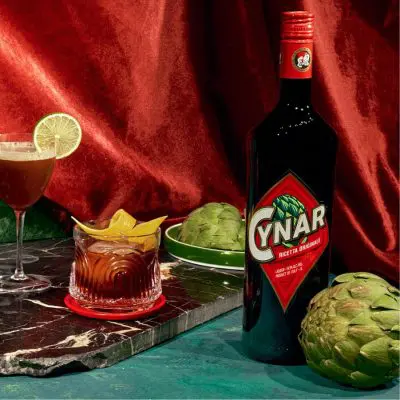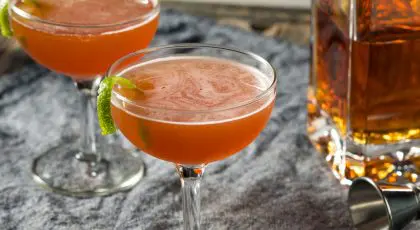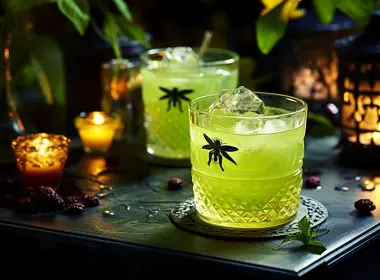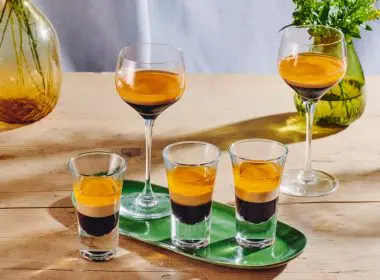Master the Art of Cynar Cocktails: Recipes, Tips, and More
Jump to:
Cynar is a bittersweet Italian amaro, made from artichokes and 13 carefully selected herbs and plants. Since its debut in 1952, it’s been a favourite in Italy and is now winning over cocktail lovers worldwide. With its earthy bitterness balanced by a hint of sweetness, Cynar brings something truly special to the table. Whether you sip it on the rocks or mix it into a cocktail, this unique liqueur is a go-to for anyone looking to try something bold and delicious.
What is Cynar?
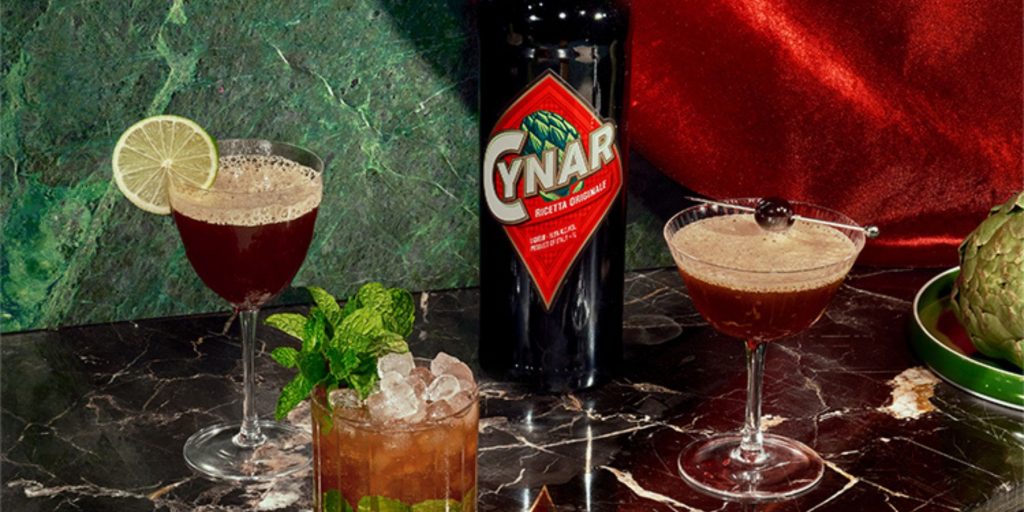
Cynar (opens in new window) is an intriguing, bittersweet amaro that combines the unlikely (but decidedly delicious) flavours of artichokes with other flavourful herbs and plants, resulting in a unique and versatile taste and aroma. It gets its name from cynarine—an active ingredient found in artichokes.
The really cool thing about Cynar (other than the epic artichoke label on its bottle) is that the cynarine takes your tastebuds on a bit of a ride. If you’re a fan of artichokes, you’ll know that any food or drink you consume after eating one tastes sweeter. And that’s exactly what happens when you drink Cynar. Exciting, right?
Read next: Beginners Guide to Cocktail and Canape Pairings
A brief history of the artichoke liqueur
This secret recipe for Cynar has remained unchanged since its creation by the Venetian entrepreneur and philanthropist Angelo Dalle Molle in 1952. It has since become a beloved Italian brand, spreading to international markets. The liqueur owes part of its popularity to its early advertising campaigns in Italy, featuring the famous actor Ernesto Calindri and the slogan ‘Cynar, against the attrition of modern life’.
DID YOU KNOW? When trying to say ‘Cynar’, you’re probably leaning towards ‘see-nahr’ at first glance, but it’s actually pronounced “chee-nahr”. That’s because C makes a ‘ch’ sound in Italian when it goes before an e, y, or i.
Why Cynar is so unique
Although it falls in the same bitter liqueur category as Campari (opens in new window) and Aperol (opens in new window), Cynar is its own entire thing. It’s a herbaceous bittersweet aperitif, rich in earthy aromas and complex flavours. Its moderate ABV (16.5%), means it is the perfect drink for any occasion. Bartenders also love to use it as a unique ingredient to create aromatic and deeply flavourful cocktails that venture off the beaten path.
Learn more: What is ABV Anyway?
How is Cynar produced?
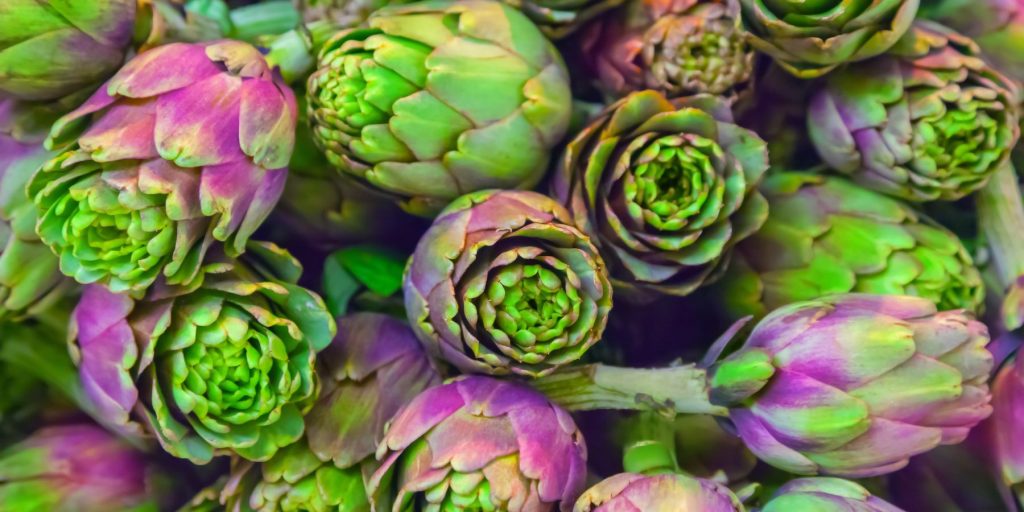
While the recipe for Cynar is a closely guarded secret, we know that its unique flavour is achieved in two stages.
- Infusion: 13 aromatic herbs and plants are combined with alcohol and water in automatic macerators and continuously mixed to release the aromas and colours. From there, the extract is collected in decanter tanks to rest for at least one month to achieve the perfect marriage of flavours.
- Blending: After about a month, the Cynar infusion is mixed with other ingredients (like treated water, alcohol, sugar, and caramel). From here, it gets filtered and is ready to be bottled, labelled, and enjoyed.
Through careful attention to every step of the process, Cynar’s creators have crafted a truly remarkable liqueur that is as complex and captivating as it is delicious.
Learn more: What is an Aperitif and When is it Served?
What does Cynar taste like?
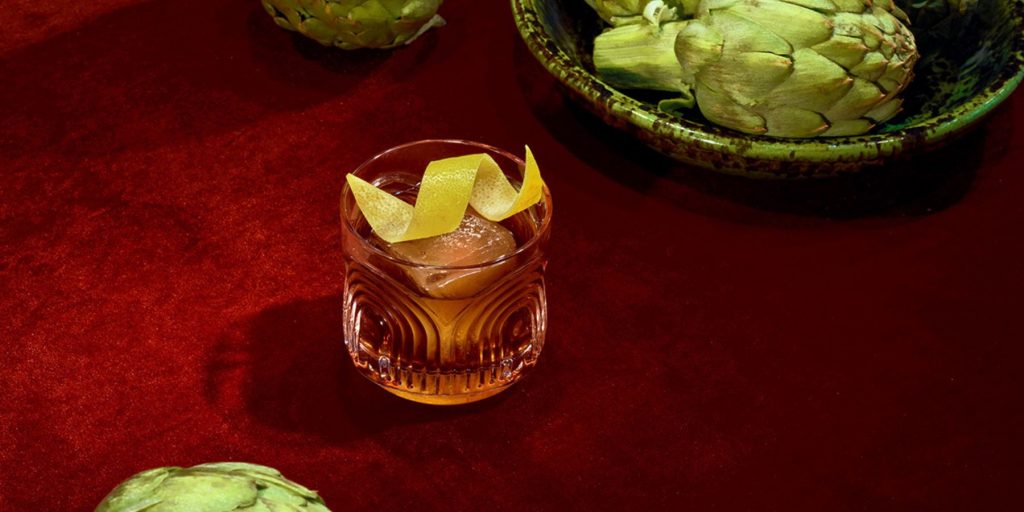
Cynar’s earthy and herbal notes make it a nuanced choice for cocktail enthusiasts who enjoy a bittersweet taste. The bold, assertive liqueur features a unique blend of bitter and sweet notes, with earthy and herbal undertones. At first sip, the bitterness is immediately apparent, but it quickly gives way to a subtle sweetness that balances out the overall taste.
The collection of herbs and plants used in the recipe contribute to the liqueur’s complex flavour profile, with notes of anise, chamomile, and fennel adding a distinct herbal quality. There are also hints of vanilla and caramel, which give the liqueur a slightly sweet and woody finish.
Cynar can be enjoyed neat, on the rocks or mixed with tonic water and pairs well with citrus, bourbon, vermouth, rum and rye.
10 Easy Cynar cocktails to make at home
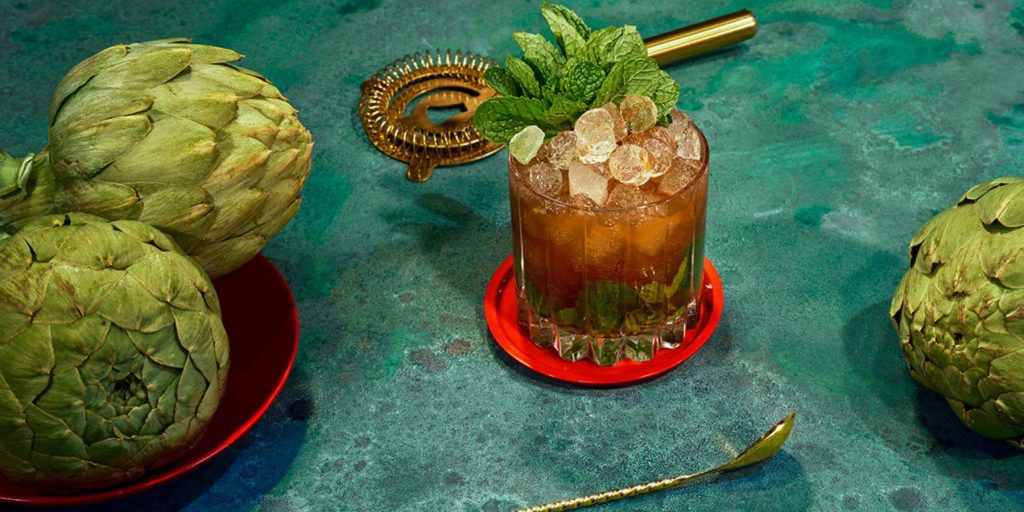
Now that you know why cocktail experts and home mixologists are crazy about Cynar right now, it’s time to use this Italian aperitif as a base for your own drinks. Try these 10 recipes at home:
1. Cynar Negroni
Put a delicious spin on the classic Negroni with this simple recipe. Combine 30 ml Bulldog Gin (opens in new window), 30 ml Cinzano Vermouth Rosso (opens in new window), and 30 ml Cynar in a cocktail mixing glass with ice and stir continuously for 30 seconds. Strain into a serving glass with fresh ice, and garnish with a lemon twist.
2. Cin Syn cocktail
This intriguing drink follows in the footsteps of the iconic Rob Roy to create a rich and warming whiskey drink with herbal accents. Combine 30 ml whiskey, 30 ml Cynar, and 30 ml Cinzano Vermouth Rosso in a mixing glass with ice. Stir until well chilled, and strain into a rocks glass with fresh ice.
3. Cynar Margarita
This smooth, rose-tinged cocktail boasts a unique symphony of flavours that results in a fascinating riff on the classic Lime Margarita. Muddle a sugar cube with 30 ml fresh lime juice in a cocktail shaker. Add 45 ml Espolòn Tequila Blanco (opens in new window), 15 ml Cynar, 10 ml Ancho Reyes Chili Liqueur (opens in new window), and a handful of ice. Shake until frosty and decant into a serving glass. Add a dash of orange bitters, then serve.
4. Bitter Giuseppe
With a dashingly bitter and herbaceous taste profile tempered by a hint of sweetness, the Bitter Guiseppe cocktail is exceptionally well-balanced, offering a memorable taste experience. Combine 60 ml Cynar, 30 ml Cinzano Vermouth Rosso, 10ml lemon juice, and 6 dashes of orange bitters in a mixing glass three-quarters filled with ice. Stir until chilled, strain into a rocks glass over fresh ice, and garnish with a lemon twist.
Also see: 9 Paper Plane Variations to Make at Home
5. Cynar Julep
A refreshing twist on the classic Mint Julep, the Cynar Julep juxtaposes the bittersweet flavours of artichoke liqueur with the bright aroma of fresh mint. Lightly muddle 6-8 mint leaves with 15 ml sugar syrup and 15 ml lemon juice in a Julep cup or highball glass. Fill the cup with crushed ice, pour 60 ml Cynar over the ice, and stir well. Add more crushed ice to fill the cup to the brim. Garnish with a sprig of fresh mint and serve with a straw.
6. Little Italy
The Little Italy (opens in new window) cocktail is one of those modern classics that tells a whole story in a single sip. If you’re planning to pour this delightful variation on the well-loved Manhattan cocktail, you better be prepared to slip into a whole Italian vibe that will likely include plenty of chef-like hand gestures, knee slaps, and big, demonstrative forehead kisses.
7. Cynar Flip
This rich and velvety cocktail celebrates the bittersweet flavour of Cynar by combining it with egg and cream, resulting in a decadent and satisfying sip. Combine 30 ml whiskey, 30 ml Cynar, 15 ml Grand Marnier, 10 ml simple syrup, 1 whole egg, and a dash or two of bitters in a shaker without ice. Shake until combined, then add ice, and shake until cool. Strain into a coupe and garnish with a dusting of freshly grated nutmeg.
8. Bensonhurst
The Bensonhurst is a sophisticated mixed drink that pairs Cynar with the smoothness of bourbon and the sweetness of maraschino liqueur, creating an intriguing flavour profile. Combine 45 ml Wild Turkey Bourbon (opens in new window), 15 ml maraschino liqueur, 15 ml Cynar, and 30 ml Cinzano Vermouth Bianco (opens in new window) in a mixing glass with ice. Stir until cool, decant into a chilled serving glass, and garnish with a Luxardo cherry.
9. Cynar Spritz
This light, refreshing aperitif comes to the party with earthy tones and sparkly effervescence, resulting in a crisp and bubbly cocktail perfect for any occasion. Simply pour 60 ml Cynar into a glass filled with ice and top it off with 90 ml Prosecco and 30 ml soda water. Top with a squeeze of fresh lemon juice before serving.
Sparkle up! 9 Spritz Cocktails to Sip On this Summer
10. Smoke Show
Sometimes you just need to show off a little. This is when we like to whip up a Smoke Show. Combining earthy mezcal with amaro, herbal liqueur, zesty lemon, and warming cinnamon, it’s a clinker in a class of its own. To make one, add 60 ml mezcal, 10 ml Cynar, 10 ml Green Chartreuse, 15 ml lemon juice, 15 ml sugar syrup, and an egg white to a cocktail shaker without ice. Shake to combine, then add ice, and shake until well-chilled. Strain into a coupe glass, and garnish with a sprinkling of cinnamon.
Learn more: The Complete Guide to Sugar Syrups (opens in new window)
How to drink Cynar (tips for the perfect serve)
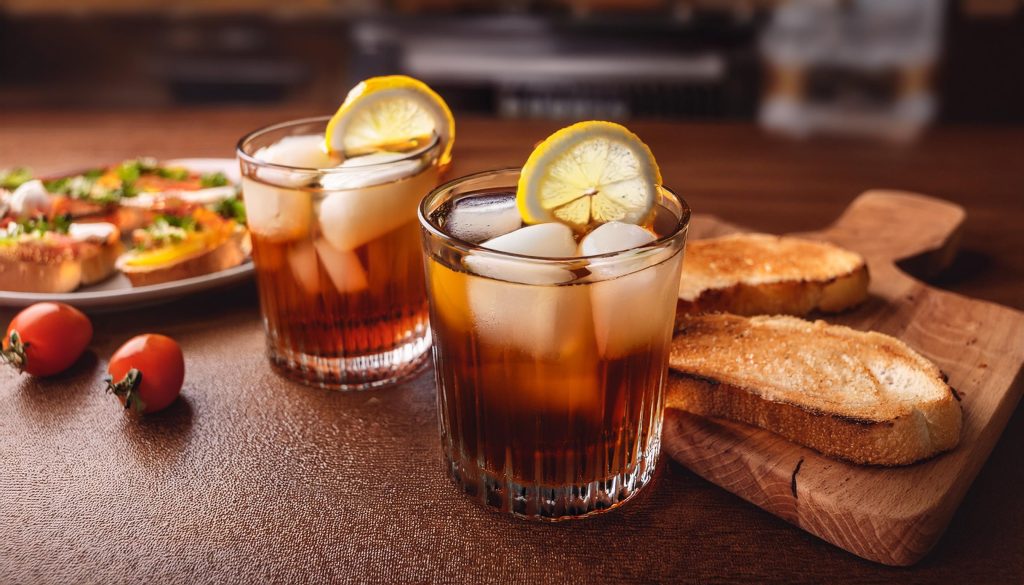
Whether you’re a cocktail pro or brand new to bitters, Cynar is a versatile spirit that can be enjoyed in a variety of ways. Here are a few simple but rewarding ways to sip and savor it:
- On the rocks: Pouring Cynar over ice is the purest way to experience its complex layers. The coolness of the ice coaxes out its subtler herbal notes, making for a smooth, earthy sip. It’s a great way to start exploring its depth.
- With soda: If you’re a fan of light, easygoing drinks, add a splash of soda water to Cynar. The effervescence lifts the bitter-sweetness while keeping things simple. It’s a go-to option for a casual aperitif before dinner.
- In classic cocktails: Bartenders and DIY mixologists alike love Cynar for its versatility. Its bitter and herbaceous profile pairs beautifully with everything from whiskey and gin to citrus and vermouth, setting the scene for creative clinkers that venture beyond the same-old, same-old.
For a delicious twist on classic spritzes, mix Cynar with Prosecco and soda water. Want to elevate your favourite fruity cocktails? To create a rich, herbaceous contrast, add a dash of Cynar to a Greyhound or Margarita.
Cynar vs. Campari: Understanding the differences

Despite their common classification as Italian bitters, Cynar and Campari (opens in new window) have unique characteristics. Here’s a quick comparison to help you understand what sets them apart:
- Flavour profile: Campari is known for its bold, bright bitterness with strong citrus and orange peel notes. Cynar, on the other hand, leans into earthier, herbal flavours, with artichoke and 13 other botanicals contributing to its nuanced taste.
- Cocktail roles: While Campari is the backbone of classics like the Negroni and Americano, Cynar shines in cocktails that want a more grounded, herbal edge. Swap Campari for Cynar in a Boulevardier or Campari Spritz for a fun and rewarding new flavour journey.
- Cultural significance: Campari has long been a symbol of Italy’s aperitivo culture, celebrated for its bracing bitterness that prepares the palate for a meal. Cynar, introduced a century later, gained popularity for its versatility and softer, sweeter bitterness. This allows it to shine in both aperitivo and digestivo roles.
Cin cin! Negroni Variations (Unique Recipes to Try at Home)
How to serve and store Cynar
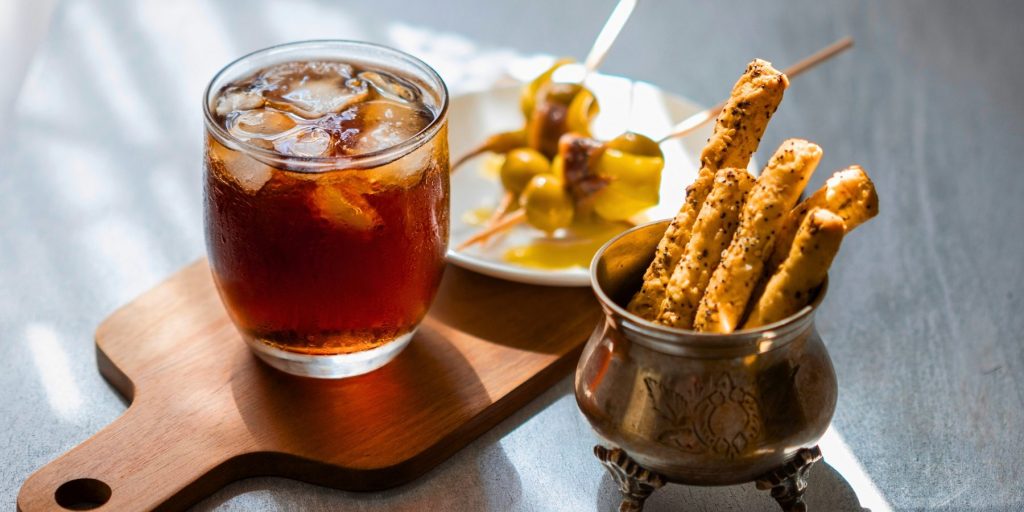
Serving Cynar
When it comes to serving Cynar, keeping a few things in mind will ensure you get the most out of every pour:
- Glassware: A lowball or Old Fashioned glass works perfectly for serving Cynar neat or on the rocks. For Cynar-based cocktails, opt for whatever glass best suits the drink.
- Temperature: Cynar is best enjoyed slightly chilled, whether you’re serving it neat, over ice, or in a mixed drink. Keep your bottle in the fridge if you prefer a colder sip.
Storing Cynar
To preserve the unique flavours of Cynar, proper storage is key:
- Keep it cool: Cynar is shelf-stable at room temperature, but storing it in a cool, dark place away from sunlight will help maintain its flavour.
- Sealed tight: Make sure the bottle is tightly sealed after each use to prevent oxidation, which can dull its aromatic qualities over time.
- No need to rush: Cynar has a pretty long shelf life, so even if you’re not using it frequently, it should stay fresh for quite a while when stored properly.
Cynar is one of those rare liqueurs that can effortlessly transform a classic or contemporary drink, whether you’re keeping it simple with soda or getting creative with cocktails. Its herbal complexity and approachable bitterness make it a must-have for anyone who loves experimenting with flavours. So go ahead — try out our Cynar recipes and see where it can take your cocktail game! You might just discover your next favourite sipper…
Remember to sign up for our newsletter to get more drinkspiration delivered straight to your inbox, and tag us in your pictures (opens in new window) when you share your creations online.
**This article was sponsored by Cynar.
